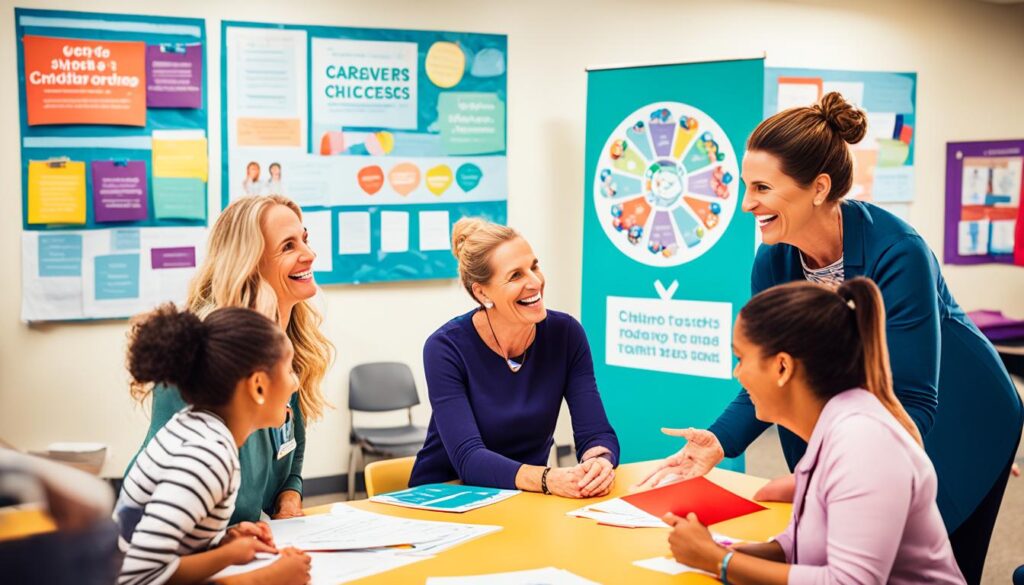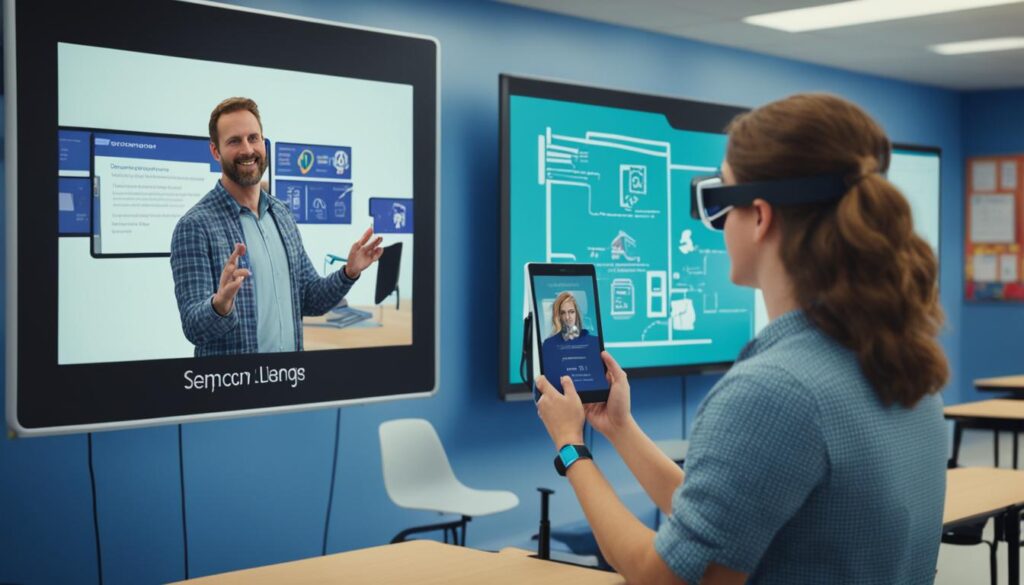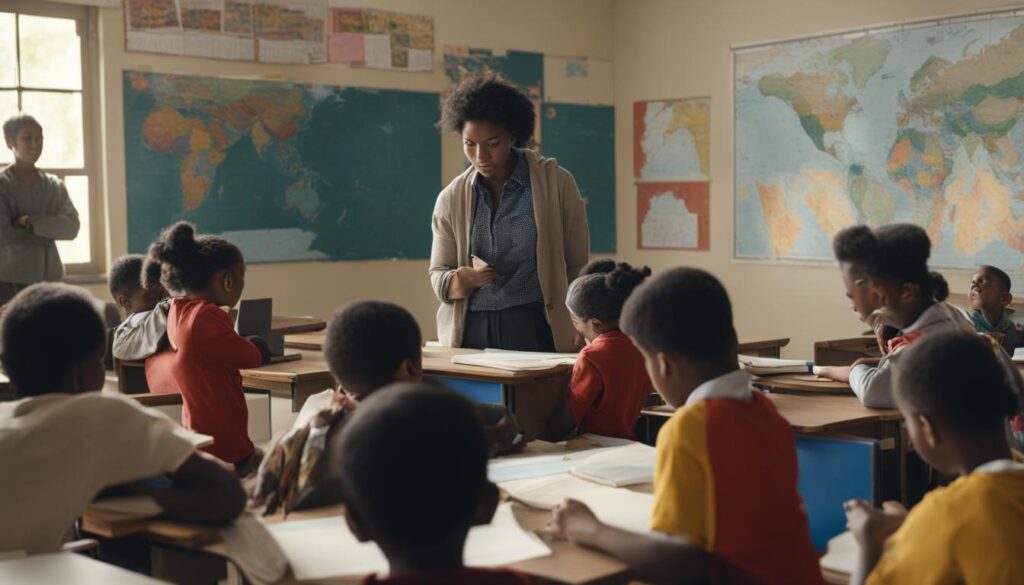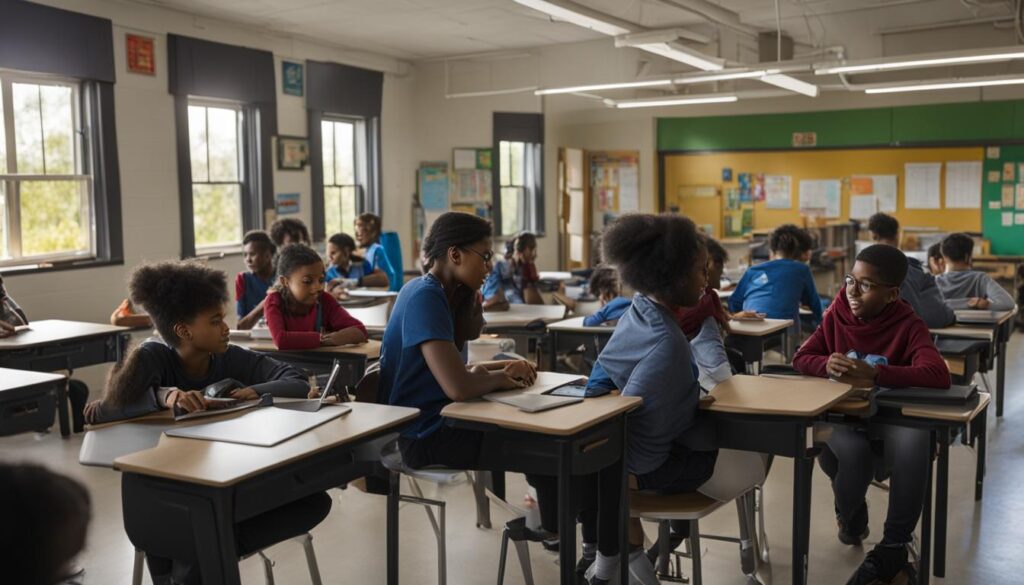Is education really the great equalizer? Are all students given the same opportunities to succeed, regardless of their background or circumstances? These questions have sparked debates and discussions for years, as educators and policymakers strive to create equitable education practices and inclusive learning environments.
In this article, we will explore the concept of forward-thinking education and how it can foster student success by promoting fairness and creating equal opportunities. We will delve into the strategies and initiatives that schools are implementing to address systemic barriers and ensure that every student has the chance to thrive.
Contents
- 1 Championing True Equity in Education: Improving Inclusion for All
- 2 Building Impactful School-Family Partnerships: Engaging Caregivers for Student Success
- 3 Bringing Indigenous Perspectives into Focus: One Canadian Teacherâs Approach
- 4 Edtech Tools Transforming Teaching and Learning: Unlocking Potential
- 5 Uplifting Students Worldwide: How Refugee Educators Unlock Potential
- 6 Preserving Tradition in Yukon Schools by Honoring Indigenous Ways of Knowing
- 7 Ontario Embraces Inquiry-Based Learning: Putting Curiosity at the Center
- 8 Encouraging Tomorrow's Innovators: The Vital Role of STEM
- 9 Meet the Educator Making Civics Exciting Through Experiential Learning
- 10 Revitalizing Democracy: Inspiring Students to Lead Change
- 11 FAQ
- 11.1 What is forward-thinking education?
- 11.2 How does promoting fairness in education benefit students?
- 11.3 What strategies can schools implement to promote equity in education?
- 11.4 Why are school-family partnerships important for student success?
- 11.5 How can schools effectively collaborate with families to create a supportive learning environment?
- 11.6 Why is it important to incorporate Indigenous perspectives in education?
- 11.7 What are some examples of educational technology tools that enhance teaching and learning?
- 11.8 How can empowering refugee educators impact the educational experiences of refugee students?
- 11.9 How do Yukon schools honor Indigenous ways of knowing and traditions?
- 11.10 What is inquiry-based learning, and how does it benefit students?
- 11.11 What is the role of STEM education in preparing students for the future?
- 11.12 How does experiential learning contribute to civic education?
- 11.13 Why is it important to empower students to become leaders and active participants in democratic processes?
- 12 Source Links
Key Takeaways
- Forward-thinking education goes beyond traditional teaching methods to prioritize innovative and inclusive practices.
- Equitable education practices aim to create equal opportunities for all students, regardless of their background or circumstances.
- Inclusive learning environments and personalized instruction are strategies that promote fairness and support students with diverse needs.
- By fostering a nurturing learning environment, forward-thinking education practices can contribute to student success.
- Promoting fairness in education requires addressing systemic barriers and creating inclusive spaces that value the unique strengths and experiences of all students.
Championing True Equity in Education: Improving Inclusion for All
Strategies for promoting equity in education
True equity in education goes beyond providing equal opportunities for all students. It emphasizes the inclusion and support of all students, especially those who have been historically marginalized or disadvantaged. To champion true equity in education, schools must address systemic barriers, promote diversity and inclusion, and ensure equal access to quality education.
Creating an inclusive school culture is paramount in promoting equity. Schools should strive to create a welcoming environment where every student feels valued and supported. This can be achieved through inclusive policies, diverse representation in curriculum and resources, as well as fostering a culture of respect and acceptance.
To truly promote equity, schools must implement inclusive teaching practices. This includes using diverse teaching methods and materials, accommodating different learning styles, and providing necessary support for students with diverse needs. By tailoring instruction to individual students and promoting differentiation, schools can ensure that every student has the opportunity to succeed.
Addressing systemic barriers is essential in promoting equity. Schools should actively work towards eliminating disparities in access to quality education. This can be done by providing equal resources and opportunities to all students, regardless of their background or socio-economic status. Ensuring equal access to educational technology, facilities, and extracurricular activities is crucial in creating a level playing field for all students.
Promoting diversity and inclusion is another key aspect of championing equity in education. Schools should actively celebrate and value diversity, embracing the unique perspectives and experiences that each student brings. This can be achieved by incorporating culturally responsive teaching practices, promoting multicultural education, and fostering an inclusive curriculum that reflects the diversity of the student body.
By championing true equity in education, schools can create an inclusive and supportive environment that meets the needs of all students. Through addressing systemic barriers, promoting diversity and inclusion, and ensuring equal access to quality education, schools can pave the way for a more equitable society.
Building Impactful School-Family Partnerships: Engaging Caregivers for Student Success

In order to support student success and promote positive academic outcomes, it is crucial for schools to build strong partnerships with families. By actively engaging caregivers in the education process, schools can create a supportive and nurturing learning environment that enhances student achievement.
One effective strategy for building impactful school-family partnerships is to promote parental involvement in education. Parents play a critical role in their child’s academic journey, and their active participation can greatly contribute to student success. Schools can encourage parental involvement by providing opportunities for parents to volunteer in classrooms, participate in parent-teacher conferences, and join school committees or advisory boards.
Another important aspect of building effective school-family partnerships is engaging caregivers in decision-making processes. By involving caregivers in key decisions related to their child’s education, schools empower them to take an active role in shaping their child’s learning experience. This can be done through parent-led committees, surveys or questionnaires, and regular communication channels that allow caregivers to voice their perspectives and provide valuable insights.
Creating effective communication channels is also essential for building impactful partnerships. Schools can use various methods such as newsletters, emails, mobile apps, and parent-teacher conferences to keep caregivers informed about important updates, upcoming events, and their child’s progress. Timely and open communication helps create a sense of trust, collaboration, and shared responsibility between schools and families.
By actively fostering caregiver engagement, schools can reap several benefits that positively impact student success. Meaningful caregiver engagement has been linked to improved student attendance, increased academic achievement, and enhanced social-emotional development. When caregivers are actively involved in their child’s education, students feel supported, motivated, and more connected to their school community.
In conclusion, building impactful school-family partnerships is crucial for enhancing student success and promoting academic achievement. By promoting parental involvement, engaging caregivers in decision-making, and creating effective communication channels, schools can foster a collaborative and supportive learning environment. Through these partnerships, caregivers become valued stakeholders in their child’s education, contributing to positive outcomes and empowering students to thrive.
Bringing Indigenous Perspectives into Focus: One Canadian Teacherâs Approach
Incorporating Indigenous perspectives in education is crucial for promoting cultural inclusivity, honoring Indigenous knowledge, and creating a more equitable and accurate representation of history and culture. One Canadian teacher is leading the way in bringing Indigenous perspectives into focus through their innovative teaching practices.
Integration of Indigenous Perspectives in Education
This teacher recognizes the importance of decolonizing the curriculum and actively promotes Indigenous languages, traditions, and knowledge systems. By integrating Indigenous perspectives across subject areas, they create meaningful learning experiences that enhance cultural understanding, challenge stereotypes, and foster a sense of belonging for Indigenous students.
Through their teaching, this educator emphasizes the following key aspects:
- Promoting Indigenous Perspectives: The teacher incorporates Indigenous perspectives and experiences into classroom discussions, assignments, and projects, allowing students to gain a deeper appreciation and understanding of Indigenous cultures.
- Engaging with Indigenous Communities: The teacher actively collaborates with local Indigenous communities to invite guest speakers, organize cultural events, and create opportunities for students to interact with Indigenous elders and knowledge keepers.
- Authentic Resources: The teacher utilizes authentic Indigenous resources, including literature, artwork, and historical accounts, to provide students with accurate and culturally rich information.
- Creating Inclusive Learning Environments: The teacher fosters a safe and inclusive classroom environment that respects and values the diverse cultures and perspectives of all students, with a particular focus on engaging Indigenous learners.
This teacher’s approach reflects a commitment to decolonizing education and creating a curriculum that reflects the true diversity of Canadian society. By promoting cultural inclusivity, honoring Indigenous knowledge, and challenging historical biases, this teacher is making a significant impact on the educational experiences of their students.
Edtech Tools Transforming Teaching and Learning: Unlocking Potential

Technology has revolutionized various aspects of our lives, and education is no exception. The integration of educational technology, or edtech, has brought about transformative teaching tools that are reshaping the learning landscape. These innovative learning platforms and digital resources have the potential to unlock the full potential of students and teachers alike.
Edtech tools offer a range of benefits that enhance instruction and engage students in meaningful ways. Interactive learning platforms provide an immersive and dynamic learning experience, enabling students to actively participate in their education. With access to a wealth of digital resources, students can explore diverse topics, conduct research, and deepen their understanding of various subjects.
One of the key advantages of edtech tools is their ability to support differentiated instruction. Teachers can tailor their lessons to meet the unique learning needs of individual students, ensuring that every learner receives the necessary support and challenge. This personalized approach fosters student engagement and helps facilitate deeper learning.
In addition, edtech tools promote student collaboration, both within the classroom and beyond. Through online discussion forums, video conferencing, and collaborative project management platforms, students can connect with their peers, share ideas, and work together on assignments. This collaborative approach not only strengthens social skills but also prepares students for the collaborative nature of the modern workforce.
Furthermore, edtech tools provide enhanced access to educational opportunities. Regardless of geographical location or socio-economic background, students can access high-quality educational resources, courses, and programs. This opens up doors to learning that may have otherwise been inaccessible, leveling the playing field and promoting equitable education.
The image below illustrates the impact of edtech tools on teaching and learning:
As the field of education continues to evolve, integrating technology in education is essential for preparing students for the demands of the modern world. Edtech tools offer exciting possibilities for transforming teaching and learning, unlocking the potential of both students and educators. By embracing these innovative tools, educational institutions can create dynamic and engaging learning environments that empower learners to thrive in an increasingly digital era.
Uplifting Students Worldwide: How Refugee Educators Unlock Potential

Refugee education is a critical issue worldwide, as many displaced individuals face significant barriers to accessing quality education. However, empowering refugee educators can have a transformative impact on the educational experiences of refugee students, creating inclusive learning environments and overcoming barriers to education.
In this section, we will explore the stories and experiences of refugee educators who are making a difference in the lives of their students. These dedicated educators have faced their own challenges and adversities, but they continue to inspire and uplift refugee students by providing them with a sense of stability, support, and hope.
Refugee educators face various obstacles, including language barriers, limited resources, and a lack of recognition for their qualifications. Nevertheless, they remain resilient and resourceful, finding innovative ways to teach and support their students.
By empowering refugee educators, we can create inclusive education systems that meet the unique needs of refugee students. These educators understand the cultural and linguistic backgrounds of their students, allowing them to create personalized and culturally responsive learning experiences.
Furthermore, refugee educators serve as role models and mentors, inspiring their students to overcome adversity, pursue their dreams, and make a positive impact on their communities. By nurturing their students’ talents, passions, and potential, these educators unlock a world of opportunities and possibilities.
Through their dedication and commitment to education, refugee educators are not only providing academic knowledge but also supporting the social and emotional well-being of their students. They create safe spaces where refugee students can learn, heal, and thrive, fostering a sense of belonging and empowerment.
Together, we can support and amplify the voices of refugee educators, recognizing the invaluable contributions they make in the field of education. By empowering these educators, we can ensure that every refugee student has equal access to quality education, regardless of their circumstances.
Join us in celebrating the resilience and impact of refugee educators and supporting inclusive education for refugees worldwide.
Explore how Canada Global Academy’s School Partnership Program is revolutionizing schools. Visit canadaglobalacademy.com/school-partnership-program/ to learn more.
Preserving Tradition in Yukon Schools by Honoring Indigenous Ways of Knowing

Incorporating Indigenous Ways of Knowing in Yukon Schools
In Yukon, Canada, schools are taking significant steps to honor Indigenous traditions and incorporate Indigenous ways of knowing into their educational practices. This commitment to Indigenous education in Yukon reflects a desire to preserve cultural traditions and promote cultural preservation in education. By embracing Indigenous knowledge systems and pedagogy, these schools are creating inclusive learning environments that foster a deep appreciation for Indigenous cultures.
“Indigenous education is about more than just curriculum; it is about recognizing and valuing the knowledge, history, and contributions of Indigenous peoples.” – Chief Darin Isaac, Cultural Educator
The incorporation of Indigenous knowledge systems in Yukon schools is crucial for creating an equitable and accurate representation of history and culture. It goes beyond the mere inclusion of Indigenous content; it is about embracing Indigenous pedagogy and ways of knowing that celebrate the interconnectedness between land, language, and culture. This approach supports cultural preservation and strengthens the sense of identity and belonging among Indigenous students.
Yukon schools are working collaboratively with Indigenous communities and Elders to develop culturally responsive curriculum and teaching practices. They ensure that Indigenous perspectives are infused across subject areas and deeply embedded in the learning experiences of all students. By doing so, Yukon schools are fostering a greater understanding of Indigenous history, traditions, and contributions.
The Impact of Cultural Preservation in Education
The efforts of Yukon schools to honor Indigenous cultures and preserve traditions have far-reaching benefits. By providing students with opportunities to learn from Indigenous knowledge keepers, Elders, and community members, schools are nurturing cultural appreciation and respect. This approach not only benefits Indigenous students but also promotes a more inclusive society that values and embraces cultural diversity.
Furthermore, incorporating Indigenous ways of knowing in education enhances the learning experiences of all students. It encourages critical thinking, promotes global citizenship, and fosters an understanding of the importance of preserving and protecting our shared natural and cultural heritage. By engaging with Indigenous knowledge systems, students develop a deep sense of empathy, cultural sensitivity, and an appreciation for the interconnectedness of all life.
Finally, the integration of Indigenous perspectives in education contributes to the collective healing and reconciliation efforts between Indigenous and non-Indigenous communities. It challenges stereotypes, corrects historical inaccuracies, and reimagines education as a tool for fostering understanding, embracing diversity, and promoting social justice.
Yukon schools are at the forefront of honoring Indigenous traditions and cultural preservation in education. By incorporating Indigenous knowledge systems and pedagogy, they are creating transformative educational experiences that empower all students to become informed global citizens who value and respect the rich cultures and traditions of Indigenous peoples.
Ontario Embraces Inquiry-Based Learning: Putting Curiosity at the Center

In Ontario, Canada, the education system is embracing inquiry-based learning as a powerful teaching approach that places curiosity and student exploration at the heart of education. This section will delve into the implementation of inquiry-based learning in Ontario schools and the profound impact it has on student engagement and learning outcomes.
By putting curiosity at the center of the learning experience, inquiry-based learning promotes critical thinking skills, fosters a culture of exploration, and develops lifelong learners. Students are empowered to take ownership of their education, driving their own learning through inquiry and investigation. This student-centered approach fosters a deep sense of engagement and motivation, as students actively seek knowledge and understanding.
Inquiry-based learning equips students with the essential skills they need for success in the 21st century. By encouraging curiosity, students develop the critical thinking and problem-solving skills essential for navigating an increasingly complex world. They learn to analyze information, evaluate sources, and construct well-reasoned arguments. This approach goes beyond rote memorization and encourages students to think creatively and approach challenges with an open mind.
Ontario’s commitment to inquiry-based learning supports a culture of exploration within the education system. As a result, students develop a natural curiosity and an intrinsic motivation to learn. They become active participants in their own education, asking questions, investigating topics of interest, and applying their knowledge to real-world situations.
This shift towards inquiry-based learning in Ontario schools reflects a broader movement towards student-centered education. By embracing curiosity and fostering a culture of exploration, Ontario is nurturing a new generation of critical thinkers, problem solvers, and lifelong learners.
So let curiosity come alive in your child’s education! Explore how Canada Global Academy’s School Partnership Program is revolutionizing schools. Visit the School Partnership Program page to learn more.
Encouraging Tomorrow's Innovators: The Vital Role of STEM

STEM (Science, Technology, Engineering, and Math) education plays a vital role in promoting innovation, fostering critical thinking skills, and preparing students for future careers. In an increasingly technology-driven world, STEM education provides students with the knowledge and skills they need to succeed in a rapidly evolving job market.
STEM education goes beyond traditional teaching methods by integrating hands-on learning experiences, real-world applications, and collaborative problem-solving. By engaging students in practical activities, such as conducting experiments, building prototypes, and analyzing data, STEM education encourages students to think critically, develop creative solutions, and apply their knowledge to solve complex problems.
One of the key benefits of STEM education is its ability to inspire and nurture young innovators. By fostering a passion for inquiry and exploration, STEM education empowers students to explore their interests, pursue their curiosity, and develop the skills necessary to tackle the challenges of the future.
Schools worldwide are recognizing the importance of STEM education and implementing strategies to promote student interest and participation in STEM subjects. From offering specialized STEM programs and courses to organizing extracurricular activities and competitions, schools are creating environments that support and encourage students’ engagement with STEM.
This hands-on learning approach not only enhances students’ understanding of STEM concepts but also helps them develop essential skills such as critical thinking, problem-solving, collaboration, and communication. These skills are transferable to a wide range of careers in STEM fields, from engineering and computer science to healthcare and environmental science.
By promoting STEM education, schools are not only preparing students for future careers but also fostering a culture of innovation, creativity, and lifelong learning. Through STEM education, schools are nurturing tomorrow’s innovators and equipping students with the skills and knowledge needed to succeed in the ever-evolving global economy.
If you’re interested in learning more about how Canada Global Academy’s School Partnership Program is revolutionizing schools through STEM education, visit their website.
Meet the Educator Making Civics Exciting Through Experiential Learning

Experiential Learning and Civic Education
Civic education plays a crucial role in promoting active citizenship, democratic participation, and fostering a sense of community responsibility. To make civics more exciting and engaging for students, one educator has been implementing experiential learning and hands-on civic education activities in their classroom.
Experiential learning allows students to actively participate in the learning process, applying their knowledge and skills in real-world contexts. By engaging students in interactive activities, simulations, and group projects, this educator creates an immersive learning environment that captures their attention and sparks their curiosity.
This hands-on approach to civic education has numerous benefits. Firstly, it promotes student engagement by making learning more relevant and meaningful. Students are actively involved in exploring and understanding civic concepts, which strengthens their understanding and retention of the material.
Additionally, experiential learning in civic education fosters critical thinking and problem-solving skills. Through interactive activities, students analyze complex issues, weigh different perspectives, and develop informed opinions. This cultivates their ability to think critically about social and political challenges, empowering them to become active and informed citizens.
Furthermore, experiential learning in civic education promotes empathy and understanding. By engaging in role-playing exercises, debates, and community-based projects, students develop a deeper appreciation for diverse perspectives and the impact of their actions on others. This cultivates a sense of empathy and fosters inclusive and respectful citizenship.
Overall, this educator’s approach to civic education through experiential learning is revolutionizing the traditional classroom experience. By offering hands-on opportunities to explore democratic processes, engage in community initiatives, and actively participate in decision-making, students are empowered to become active citizens who contribute positively to their communities.
Explore how Canada Global Academy’s School Partnership Program is revolutionizing schools. Visit https://canadaglobalacademy.com/school-partnership-program/ to learn more.
Revitalizing Democracy: Inspiring Students to Lead Change
Empowering student leadership and fostering democratic participation are fundamental for revitalizing democracy and driving positive social change. By giving students the tools, knowledge, and opportunities to become active agents of change, schools can cultivate a generation of engaged citizens who are committed to making a difference in their communities.
One strategy for empowering student leadership is through the establishment of student councils. These democratic platforms provide an avenue for students to voice their opinions, propose initiatives, and collaborate with school administrators and teachers to address issues that affect them. Through student councils, young leaders can develop valuable skills such as public speaking, negotiation, and teamwork, while also actively participating in decision-making processes that impact their educational experience.
Another powerful approach to inspiring student-driven change is by encouraging youth activism. By supporting student-led advocacy groups or providing resources for students to organize community campaigns, schools can empower students to take a stand on social, environmental, and political issues that they are passionate about. Youth activism not only develops critical thinking skills and empathy, but also gives young individuals a sense of agency and the confidence to challenge the status quo.
Civic engagement is a key component of revitalizing democracy. Schools play a pivotal role in fostering civic engagement among students, providing opportunities for them to actively participate in democratic processes. Community service initiatives, such as volunteering at local organizations or participating in outreach programs, allow students to contribute to their communities, develop a sense of social responsibility, and understand the importance of their role in shaping a more equitable and inclusive society.
FAQ
What is forward-thinking education?
Forward-thinking education is an approach that goes beyond traditional teaching methods, emphasizing innovative and inclusive practices that promote fairness and equality.
How does promoting fairness in education benefit students?
Promoting fairness in education creates equal opportunities for all students, regardless of their background, abilities, or socio-economic status, fostering student success and creating a nurturing learning environment.
What strategies can schools implement to promote equity in education?
Schools can address systemic barriers, promote diversity and inclusion, and ensure equal access to quality education as strategies to promote equity in education.
Why are school-family partnerships important for student success?
Building impactful school-family partnerships improves student attendance, increases academic achievement, and enhances social-emotional development.
How can schools effectively collaborate with families to create a supportive learning environment?
Schools can promote parental involvement in education, engage caregivers in decision-making processes, and create effective communication channels to collaborate with families and foster student success.
Why is it important to incorporate Indigenous perspectives in education?
Incorporating Indigenous perspectives promotes cultural inclusivity, honors Indigenous knowledge, and creates a more equitable and accurate representation of history and culture.
What are some examples of educational technology tools that enhance teaching and learning?
Interactive learning platforms, digital resources, and personalized learning programs are examples of edtech tools that enhance instruction, promote student collaboration, and provide access to educational opportunities.
How can empowering refugee educators impact the educational experiences of refugee students?
Empowering refugee educators uplifts students, provides stability and support, and creates inclusive learning environments for refugee students.
How do Yukon schools honor Indigenous ways of knowing and traditions?
Yukon schools embrace Indigenous pedagogy, foster cultural appreciation, and create inclusive learning environments for Indigenous students to honor Indigenous ways of knowing and preserve traditions.
What is inquiry-based learning, and how does it benefit students?
Inquiry-based learning is an approach that puts curiosity and student exploration at the center of education. It promotes critical thinking skills, fosters a culture of exploration, and develops lifelong learners.
What is the role of STEM education in preparing students for the future?
STEM education promotes innovation, fosters critical thinking skills, and prepares students for future careers in science, technology, engineering, and mathematics.
How does experiential learning contribute to civic education?
Experiential learning in civic education promotes student engagement, critical thinking, and empathy, empowering students to become active and informed citizens.
Why is it important to empower students to become leaders and active participants in democratic processes?
Empowering students as leaders and active participants in democratic processes revitalizes democracy, creates positive social change, and gives young voices the opportunity to shape society.
Source Links

Education Disruptor proudly collaborates with leading innovators in the education sector who share our passion for reshaping K12 education. We extend our sincere gratitude to the following organizations for their support. Ethos Education in collaboration with Canada Global Academy who are the exclusive authorized provider of the 3rd globally ranked Ontario Ministry of Education‘s renowned K12 curriculum and Digital Learning Platform outside of Canada.
Through their School Partnership Program, they empower schools worldwide to attain Canadian Accreditation, providing the opportunity to establish themselves as Canadian Accredited schools. Additionally, home-based businesses can run their own Canadian Accredited Micro-School. Contact them today to learn more!


